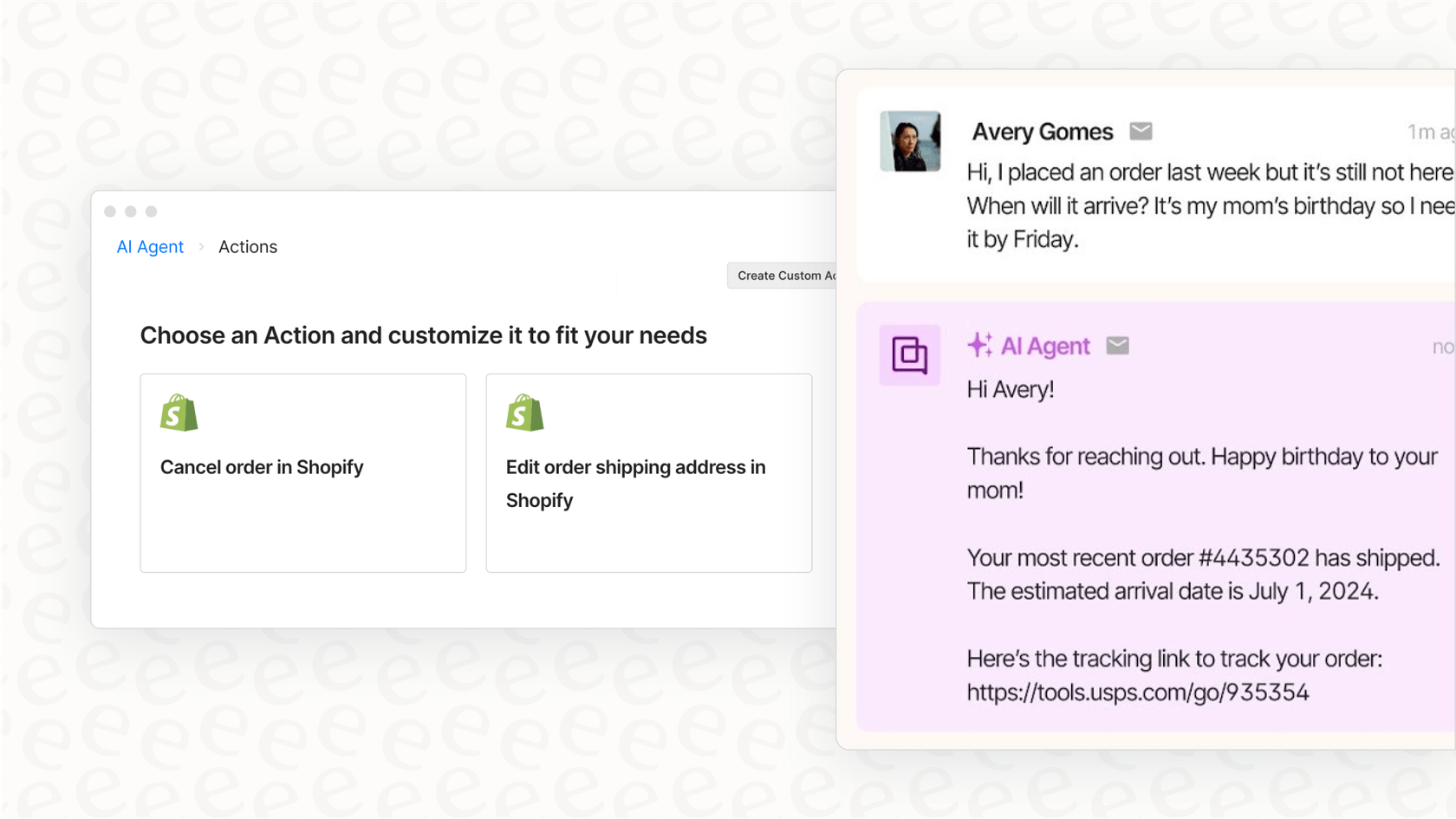Gorgias ticket limit: A complete 2026 guide to its pricing model

Stevia Putri

Stanley Nicholas
Last edited January 16, 2026
Expert Verified

If you're running an e-commerce brand, you've probably heard of Gorgias. It’s the go-to helpdesk for stores on Shopify, and for good reason: it’s excellent at pulling all your customer conversations into one spot. As your brand grows, it is important to understand how to manage your Gorgias ticket limit effectively to ensure your support team stays productive and your budget remains clear.
The Gorgias model is based on usage, which means your plan scales alongside your volume. This is great for brands that experience seasonal fluctuations, such as a killer marketing campaign, a product going viral on TikTok, or the holiday rush. By understanding how the ticket allowance works, you can better prepare for these periods of high engagement.
This guide is here to help you navigate the system. We're going to explain what Gorgias counts as a "billable ticket," how tiered pricing works to support your growth, and how you can manage your ticket volume effectively. Getting a handle on this model is the first step to finding a scalable way to manage your customer support as you grow in 2026.
What is Gorgias?
At its core, Gorgias is a customer service helpdesk designed specifically with e-commerce businesses in mind. Its biggest strength is how it centralizes all your customer chats, from email, live chat, and social media comments, into a single, organized dashboard.

It plays especially well with platforms like Shopify, Magento, and BigCommerce. This means your support agents can see a customer's order history and shipping details right next to their message, which saves a ton of time and provides a more personalized experience.
Unlike some software that charges per support agent, Gorgias’s pricing revolves around ticket volume. Your monthly plan is tied to the number of customer inquiries you handle, allowing you to have as many team members as you need without increasing the cost per seat. This model ensures your whole team can access the platform to help customers.
How the Gorgias ticket limit and pricing actually work
Gorgias builds its pricing structure around a monthly allowance of "billable tickets." Once you understand how this works, it becomes easier to plan your support strategy. Let’s break it down.
What counts as a billable ticket?
First things first: what does Gorgias actually consider a "billable ticket"? A ticket becomes billable the moment a message is sent from your Gorgias account in response to an inquiry. Whether that reply is written by an agent, sent by an automated Rule, or handled by the Gorgias AI, it counts toward your monthly limit.
This comprehensive tracking ensures every customer interaction is recorded, which is helpful for several reasons:
-
Automated efficiency: If you have an auto-responder set up to let customers know you received their email, Gorgias ensures these are tracked. This helps maintain a high standard of customer experience by acknowledging every message that reaches your inbox.
-
Proactive engagement: That friendly chat bubble on your website is a fantastic tool for engaging visitors. When a customer replies to a prompt, Gorgias captures this as a billable ticket, ensuring you have a full record of the pre-sale conversation.
-
Continuous conversations: If a customer replies to an old thread with a new question, Gorgias may create a new ticket. This keeps your data organized by ensuring new inquiries are treated with fresh attention, even if they come from existing customers.
-
Advanced AI resolution: If you're using the Gorgias AI Agent, it can resolve issues independently. This counts as a billable ticket because Gorgias has successfully managed the interaction for you, often saving your agents significant time.

What happens when you go over the Gorgias ticket limit?
Gorgias is designed to scale with you. When you reach your monthly ticket limit, the platform continues to work seamlessly by automatically moving you into flexible overage blocks. This ensures you never miss a customer inquiry during high-traffic periods.
Let's look at the Basic plan as an example. It includes 300 tickets for $60 a month. If your volume increases, you can easily add blocks of 100 tickets for $40.
If your e-commerce store runs a successful Black Friday sale and your volume jumps from 280 to 500 tickets, the math looks like this:
- Base fee: $60 (for the first 300 tickets)
- Overage for tickets 301-400: +$40
- Overage for tickets 401-500: +$40
In this scenario, your total is $140. While it is more than the base fee, it reflects the increased success and customer engagement your brand is experiencing. This flexibility allows you to handle seasonal surges without having to commit to a higher permanent tier.
Considerations for scaling with the Gorgias ticket limit
The ticket-based model offers a clear relationship between your support costs and your business volume. However, as you grow, there are a few strategic points to keep in mind.
First, it’s helpful to practice budget management by forecasting your busiest months. Since Gorgias is usage-based, knowing when your peak seasons occur, like new collection launches or holiday sales, allows you to anticipate your helpdesk needs. This helps you treat support as a scalable variable expense that grows alongside your revenue.
Second, this model encourages your team to focus on high-quality customer support. Because Gorgias provides the tools to manage every interaction, your team can focus on finding the most efficient and helpful ways to resolve issues. This leads to a more streamlined support process where every message counts toward building a better customer relationship.
Finally, Gorgias is built for scalability. As your customer base expands, your ticket volume will naturally increase. The tiered pricing model supports high-growth brands by offering more advanced features and lower costs per ticket as you move into higher plans. This ensures that as you become more successful, Gorgias provides the enterprise-grade tools you need to stay at the top of your game.
Complementing Gorgias with AI automation
A modern approach to support is about maximizing the value of your tools. While Gorgias provides the foundation for your customer service, you can enhance your setup with a support automation layer. This is where a tool like eesel AI comes in, offering a complementary way to scale your support without significantly increasing your ticket volume.
eesel AI isn't a replacement for Gorgias; instead, it's an option that works within the Gorgias ecosystem to help your agents work more effectively. Here’s how it complements your setup:
-
Predictable monthly value: The pricing for eesel AI is built around a flat monthly fee. This includes a large pool of AI interactions, helping you handle more inquiries without always hitting your next Gorgias tier. It makes your overall support budget more predictable.
-
Seamless integration: You don't need to change your workflow. eesel AI is designed to be easy to set up and connects to your Gorgias account with a few clicks. It assists your team in the dashboard they already use.
-
Data-driven confidence: Before fully implementing automation, eesel AI offers a simulation mode. You can test it against your past tickets to see exactly how it would have handled them. This gives you a clear picture of the value it adds before you go live.
-
Flexible control: You stay in charge of how much you automate. You can use eesel AI to handle repetitive questions, like "Where is my order?", while ensuring more complex inquiries are always routed to your expert agents in Gorgias.
Gorgias ticket limit: Pricing plans in full
Here is a full breakdown of the standard Gorgias pricing plans. These tiers are designed to provide the right level of support for every stage of your business growth.
| Plan | Price (Monthly) | Billable Tickets Included | Overage Cost | Best For |
|---|---|---|---|---|
| Starter | $10/mo | 50 / month | +$0.40 / ticket | Very small stores with minimal support volume. |
| Basic | $60/mo | 300 / month | +$40 / 100 tickets | Small teams managing a few hundred inquiries per month. |
| Pro | $360/mo | 2,000 / month | +$36 / 100 tickets | Growing brands that need more integrations and reporting. |
| Advanced | $900/mo | 5,000 / month | +$36 / 100 tickets | Larger teams with complex support needs and higher volume. |
| Enterprise | Custom | Custom | Custom | High-volume businesses requiring custom terms and support. |
Gorgias also offers powerful add-ons like Voice and SMS to provide a truly omnichannel experience. When combined with their AI features, these tools ensure you have a robust, enterprise-grade solution for all your customer service needs.
Beyond the Gorgias ticket limit: Maximizing your support potential
Gorgias is an industry-leading platform that has powered customer service for thousands of successful companies. Its tiered model provides a clear path for growth, ensuring you have the features you need as your brand matures. By understanding the ticket limit and planning for your volume, you can turn your helpdesk into a powerful engine for customer loyalty.
Modern AI platforms like eesel AI can work alongside Gorgias to help you scale even more effectively. By focusing on efficiency and value, these tools give your team the freedom to provide the high-quality service your customers expect.
Ready to see how AI can enhance your Gorgias setup? Try eesel AI today and discover how much you can automate with our risk-free simulation mode.
Frequently asked questions
A ticket becomes billable when a message is sent from your Gorgias account in response to a customer inquiry. This ensures that every interaction is tracked and managed within your Gorgias dashboard, whether it's handled by an agent, a rule, or the Gorgias AI.
If you go over your monthly limit, Gorgias provides flexible overage options to ensure your service remains uninterrupted. For example, on the Basic plan, you can add blocks of 100 tickets for $40, allowing you to scale your support during busy periods like sales or holidays.
Yes, using the Gorgias AI Agent helps resolve customer queries efficiently. These interactions count towards your helpdesk tickets, and depending on your plan, may also include automation features designed to streamline your support workflow.
The usage-based model allows brands to scale their support resources in line with their growth. By monitoring ticket volume, businesses can choose the tier that best fits their needs, ensuring they only pay for the value they receive as their customer base expands.
Yes, Gorgias offers several plans, from Starter to Enterprise, each with a different monthly billable ticket allowance. If you exceed this, overage costs are available to keep your operations running smoothly, typically charging for blocks of additional tickets (e.g., $40 per 100 on Basic, $36 per 100 on Pro/Advanced).
Yes, Gorgias centralizes all customer conversations from various channels like email, live chat, and social media. Any response sent from your Gorgias account on any of these channels will count towards your monthly Gorgias ticket limit, keeping all your data in one place.
Share this post

Article by
Stevia Putri
Stevia Putri is a marketing generalist at eesel AI, where she helps turn powerful AI tools into stories that resonate. She’s driven by curiosity, clarity, and the human side of technology.




